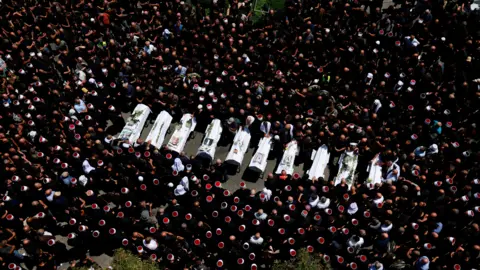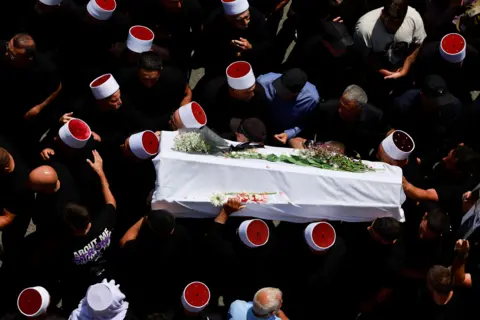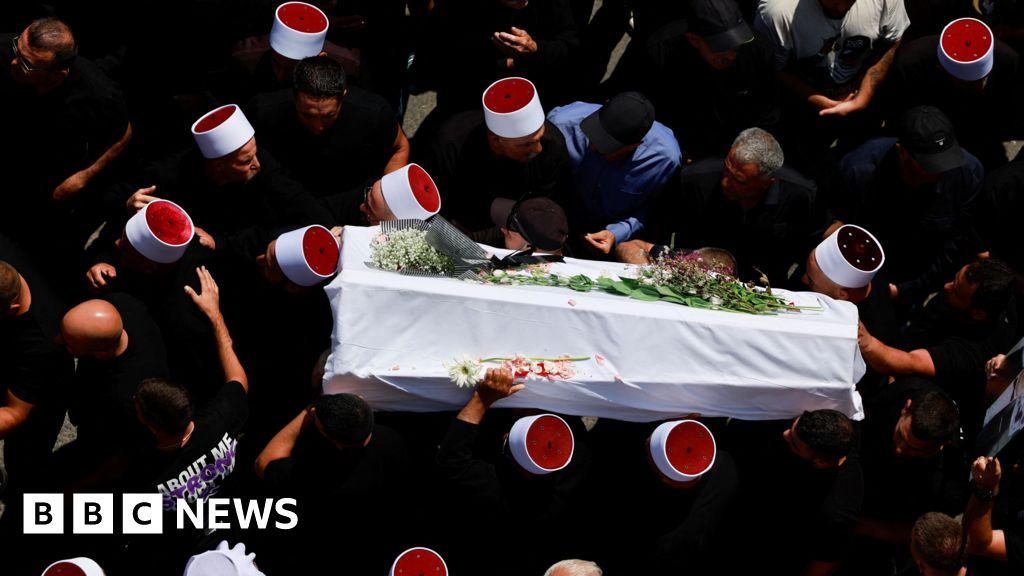 Reuters
ReutersThousands of people gathered for funerals of children and young people on Sunday Killed in rocket attack In the Israeli-occupied Golan Heights, world leaders scrambled to contain the political fallout from the attack.
According to Israeli media reports, members of the Druze community wept as they carried the coffin through the streets of Majdal Shams, with some shouting angrily at government ministers attending the funeral.
Israel blamed the Iran-backed militant group Hezbollah for the attack, which killed 12 people.
Global leaders condemned the attack on Sunday and moved to de-escalate tensions amid fears the incident could trigger a war between Israel and Hezbollah.
The Israel Defense Forces (IDF) attacked Hezbollah targets in Lebanon overnight in response to Saturday’s attacks, and Hezbollah attacked two Israeli military bases on Sunday.
Since Hamas attacked Israel on October 7, triggering Israeli military operations in Gaza, cross-border exchanges of fire between the two sides have continued to escalate. Saturday’s attack was the deadliest on and around Israel’s northern border since October.
The strike hit a football stadium in Majdal Shams, one of four towns in the Golan Heights home to about 25,000 members of the Arabic-speaking Druze religious and ethnic group.
The Israeli Ministry of Foreign Affairs stated that 10 of the 12 victims were between the ages of 10 and 16, and did not disclose the ages of the other two victims.
Prime Minister Benjamin Netanyahu, who arrived in Israel on Sunday after cutting short a trip to the United States, vowed that Hezbollah would “pay a heavy price.” He plans to hold a meeting with military chiefs to assess the situation and approve a battle plan.
Hezbollah denied any involvement in the attack but earlier on Saturday claimed responsibility for four other attacks, including one at a military base about 3 kilometers (2 miles) away.
Weeping men wearing traditional red and white hats carried 10 white coffins through crowded streets at a funeral in Majdal Shams on Sunday, AFP reported. Women in black robes wept as they laid flowers on the coffin. Some mourners carried large photos of the dead children.
Fadi Mahmud, 48, told AFP it was the first time Majdal Shams had suffered such losses during the war.
“Our community is very close-knit. These kids are like everyone’s kids in the village,” he reportedly said.
According to the Times of Israel, community anger also boiled over at the funeral, with some directing their anger at Israeli government officials in attendance.
“Now you’re here? You haven’t been here for ten months!” a man in military uniform reportedly shouted at Housing Minister Nir Barkat and Environment Protection Minister Edith Silman. His comments were met with applause.
“We’re tired of your promises!” another reportedly yelled at Finance Minister Bezalai Smotrich.
In a video posted on social media, hecklers surrounded Smotrich, cursing and saying, “We don’t want him!” according to a translation by The Times of Israel.
Israeli media reported that the Druze leader asked government ministers in a letter not to attend the funeral to avoid turning the tragedy into a “political incident”.
 Reuters
ReutersThe Druze are part of an Arabic-speaking ethnic group living in Lebanon, Syria, the Golan Heights and northern Israel. In Israel, they have full civil rights and constitute about 1.5% of the total population.
But most people in the Golan Heights remain loyal to Syria. They can still study and work in Israel, although only those with citizenship can vote and serve in the military.
The vast majority of the international community does not recognize Israel’s annexation of the Golan Heights from Syria in 1981.
On Sunday, global leaders spoke out against the attack and warned against escalation, even as they disagreed over who was responsible.
British Foreign Secretary David Lamy posted on
“We are deeply concerned about the risk of further escalation and instability,” Secretary Lamy said.
U.S. Secretary of State Antony Blinken said “all indications are that this rocket did come from Hezbollah” but that the United States did not want to see the conflict spread.
Lebanese Foreign Minister Abdullah Bouhabib told the BBC he believed Hezbollah, which usually attacks military targets rather than civilians, carried out the attack, but added that “it could have been Israelis or Hezbollah.” Wrong – I don’t know”.
The Lebanese government condemned the violence and called for a comprehensive ceasefire in a statement.


